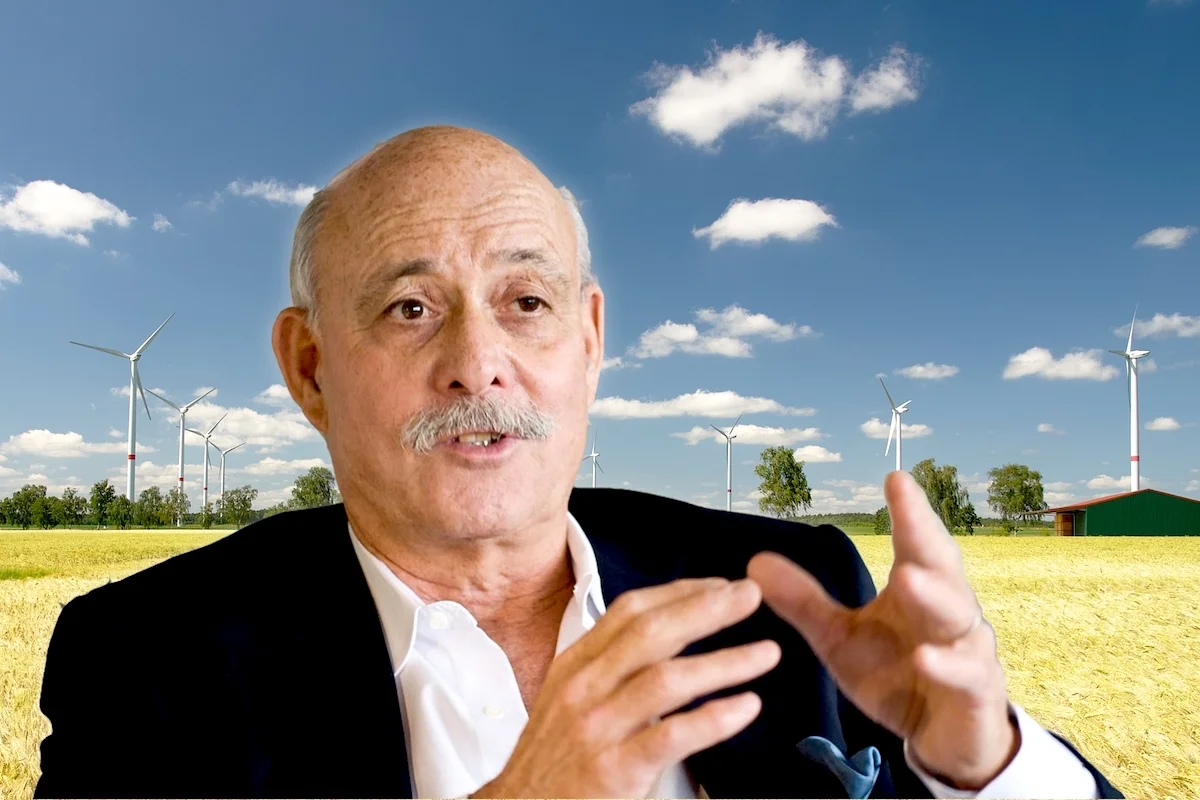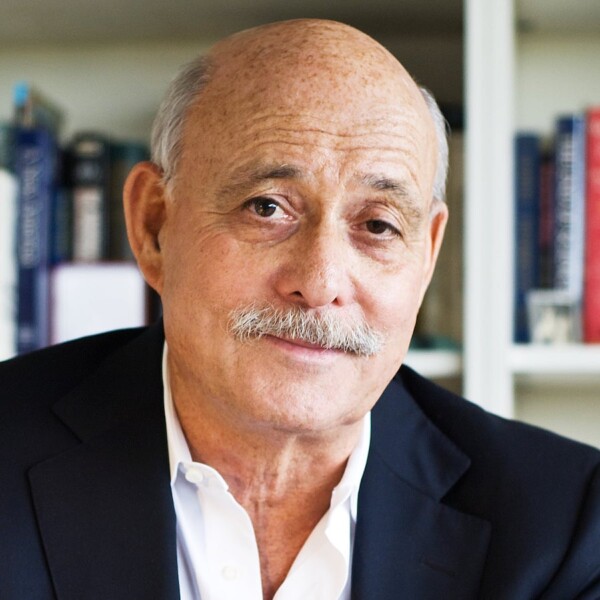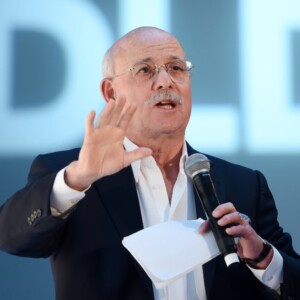
Jeremy Rifkin: “The Fossil Fuel Civilization Is Collapsing”
In “The Green New Deal”, author Jeremy Rifkin argues that renewable energy can prevent the worst of climate change.
In his newest book, The Green New Deal, economist and bestselling author Jeremy Rifkin makes the case that smart technologies in connection with renewable energies can still help to avert a climate catastrophe. But it won’t be easy, he told DLD in an interview. “It’s a razor-thin path.”
Jeremy Rifkin has a talent for spotting the outlines of the future long before tomorrow’s trends become visible to everyone else. Some 20 years ago, for example, he wrote The Age of Access – predicting a world in which consumers would stop buying products in favor of simply paying to use them. Digital technologies and the Internet would enable new business models and make products obsolete much more quickly, Rifkin reasoned, so renting would often make more sense than buying.
Jeremy Rifkin is a bestselling author and consultant to governments and corporations around the world.
Speaker Profile
We live in this “age of access” now, of course – an age of video streaming, car sharing, software as a service and cloud computing. Such foresight has made Rifkin, founder of the Foundation on Economic Trends as well as a private consulting group, a sought-after economic advisor. Many political leaders have met with the 74 year-old American to exchange ideas, among them France’s Emmanuel Macron and Germany’s Angela Merkel.
The next big shift for the global economy, Rifkin predicts, will be a shift away from centralized systems and vertical, isolated structures in favor of more openness, distributed power and collaboration between companies and citizens – because that is, in his view, what a networked economy inherently favors. Rifkin presented these ideas in detail at DLD 2016 and is now exploring them further in his latest book, The Green New Deal, in which he calls for a complete rethink of energy production and distribution in order to contain the effects of climate change.

Jeremy Rifkin
Economist
“The technology is now here. We don’t need any more R&D. There are no excuses.”
The good news is that this change is already well underway. Comparable costs for renewable energy, such as solar and wind power, have dramatically fallen, Rifkin reports, making coal, oil and gas unsustainable – not just from an environmental perspective but financially as well. Renewable energy prices are “on a deep, plunging, exponential curve, like computer chips were”, Rifkin says. “The fossil fuel civilization is collapsing.”
Constructing new coal and gas power plants makes no sense anymore, Rifkin argues, because it takes decades for such investments to pay off: “These are stranded assets”, he says. “They won’t amortize out.”
A successful transition to renewable energy, however, also requires building an entirely new infrastructure. The wind doesn’t always blow, the sun doesn’t always shine – so electricity harvested from natural sources needs to be moved around, dynamically, from places that have plenty to others that need more. As part of this effort, homes and office buildings can become power plants, feeding energy back into the grid once they’re equipped with solar panels on their roofs. Even electric cars, parked and charged, could become part of a new, distributed energy system – provided that the infrastructure is intelligent enough to support it.
This means upgrading power grids, installing sensors and switches, making the distribution networks smart enough to handle two-way electricity traffic and respond in real-time. Along the way, Rifkin foresees the creation of “millions and millions of jobs” because “robots and AI are not going to put in underground cables, wind turbines and charging stations.”
To finance this herculean task Rifkin proposes tapping into the wealth of pension funds which globally control some $28 trillion. Many of them are dropping investments in fossil fuels, looking for new areas to invest in. “The money is there”, he says. “You have trillions of dollars of pension funds, desperate to get out of stranded assets.”

Jeremy Rifkin
Economist
“Robots and AI are not going to put in underground cables, wind turbines and charging stations.”
A smart, green energy infrastructure would be the perfect opportunity for such funds, Rifkin believes. What he sees missing so far is the political will to kickstart the effort and coordinate the fundamental changes required. “Businesses can build, they can manage”, Rifkin says. “But the infrastructure itself is a common good that will have to be put in by the government.”
In an interview with DLD, Jeremy Rifkin expressed confidence that a new generation of political leaders will speed up the transition towards an economy powered by renewable energy – not the least because voters demand it. The following excerpts of the conversation have been edited for brevity and clarity.
What’s the connection between green energy and the digital revolution?
The communication Internet is converging with the renewable energy Internet, with a digitized mobility and logistics Internet – riding on top of the Internet of Things. That moves us into a world that is totally connected in digital flows.
The Third Industrial Revolution: At DLD Munich 2016, Jeremy Rifkin explained why a connected economy brings fundamental changes to doing business.
Which benefits does that bring?
What we’re creating is a global brain and nervous system for the human race. We have sensors that are constantly monitoring data – in agriculture, factories, smart homes, smart vehicles, smart road systems. That data can be mined with analytics by any company so that they can increase their aggregate efficiencies, reduce their costs, reduce their carbon footprint – and create new business models that are post-carbon and circular.
You predict the “collapse of the fossil fuel industry” by 2028. Why?
Our projections show that around 2028 you’re getting the transition to electric vehicles. The reason this is crucial is: We consume 90 billion barrels of oil around the world per day. Two thirds of that oil goes to transport. That’s the inflection point – and the collapse of the fossil fuel economy.
Here’s the challenge: While the fossil fuel civilization is collapsing – and all the industries that relate to it – we have to ratchet up very quickly an infrastructure for a green new deal in order to transition to a post-carbon society. And if we don’t do that quickly at scale – not pilots, but scale – we’re going to be left with a vacuum.
How do we manage the transition?
The biggest problem we face is that old codes, regulations and standards are blocking us, because they were designed for the old infrastructure. So we need a new generation of political leaders at the local, regional and national level that help us move forward.
The technology is now here. We don’t need anymore R&D. Solar and wind power are now cheaper, the communication Internet is well advanced, transportation is moving to electric vehicles, the IoT and the building environments are all there.
We don’t need any more of that – we just need scale. The money is there to do this. And now we have to have the political will and the social conscience to get the job done.

Jeremy Rifkin
Economist
“The problem is that we’re still in a geopolitical world but the biosphere doesn’t have boundaries.”
Are you confident that we can make the necessary cultural and political changes to avoid a climate catastrophe?
I’m guardedly hopeful. What I’m saying to people is: There are no excuses. When I talk to government leaders or the financial community – don’t give me any excuses. I don’t want to hear “It’s going to take a while.” Or “Let’s be realistic.” Young people don’t want to hear that either. They don’t want to hear that “this is one of many issues” when it’s a matter of survival.
Some people may find this alarmist.
Climate change is now deeply affecting everyone. There are heat waves, floods, hurricanes, wildfires, and people are saying, “This is beyond anything we’ve ever seen. This is going to get worse.” That fear has to be turned to motivation. People understand that this is a turning point where the only mission we have – no sidetracks – is this one. Otherwise we’re going to lose, potentially, half of the species on Earth in eight decades.
It’s a razor-thin path. People will have to get used to the fact that the weather is going to change, that the planet is rewilding itself in ways that we can’t even imagine. It’s going to force us to rethink all of our basic assumptions about what it means to live on the Earth, what our history is, who we are as a species, what our responsibility is to the rest of the Earth. This is a massive change in a very short period of time.
The challenge you describe seems to require far more pan-national cooperation than we’re seeing.
The problem is that we’re still in a geopolitical world but the biosphere doesn’t have boundaries. We’ve lived under this fiction that we could section off nation states for national markets. Then we secured fossil fuels – but we had to do that with geopolitics and then we fought wars for those fossil fuels. Millions of people died for fossil fuels, and we weaponized the whole world for it!
How do you expect that to change?
When we move off of fossil fuels, we move off the militarization of the world. In the last part of the book I talk about the necessary shift from geopolitics to biosphere politics. Nature never had any borders. The sun, the wind, the hydrosphere, the atmosphere, they all interact.
Renewable energy forces shareability. You’re responsible for sustainability where you are, and you know you have to rely on others. Because sometimes you don’t have the sun and some other region does and the high voltage power grid will send it to you – or the wind or the water power.
It actually forces people to learn how the biosphere belongs to all of us. You don’t even have to be a good person to understand that.

A Green New Deal for Europe
By loading the video you agree to the privacy policy of YouTube.
You are currently viewing a placeholder content from YouTube. To access the actual content, click the button below. Please note that doing so will share data with third-party providers.
More Information